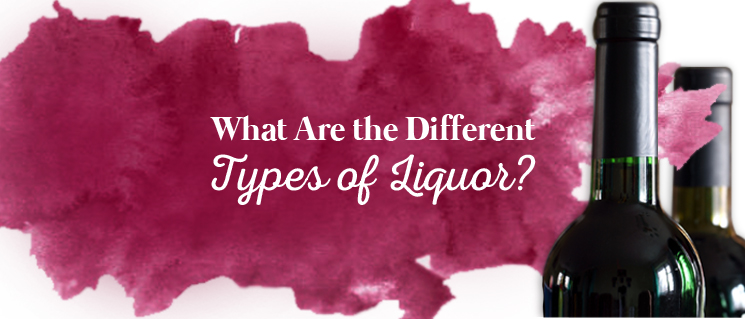
Whether you’re expanding the drinks in your home bar or getting into distilled spirits for the first time, you should know what types of liquor are out there. Learning the different types of liquor creates a foundation for moving onto cocktails and mixed drinks, and it allows you to understand the best way to drink each type of spirit, either by itself or in a beverage. But what exactly is liquor?
As the base of countless cocktails, liquor serves as an essential addition to almost every mixed drink. There are many kinds of liquor made of all different ingredients, giving them complex flavors and unique uses. We’ve gathered a list below that explains all types of liquor, along with signature drinks made with each so you can get an idea of what you can use each hard alcohol in when making mixed drinks.
If you’re new to the world of spirits and cocktails, the list below may seem overwhelming. Before diving in, you may find these terms helpful.
- Simple syrup: Sugar dissolved in equal parts water
- Liqueur: Hard alcohol with added sugar — we’ll go into detail after the list of liquors
- Bitters: Concentrated infusions of spices, fruits, seeds and more
- Muddle: Releasing the flavors of herbs and other ingredients by pressing them with a muddler
- Lemon, lime or orange twist: A ribbon of citrus peel twisted into a curl for garnish
- Sour mix: A combination of simple syrup with lime and lemon juice
The ingredients and techniques above don’t appear in every cocktail, but they are helpful to add to your base of knowledge as you learn about the types of liquor. Now that you know some of the basics, let’s explore the world of spirits! Before we talk about the different types of liquor, we will first explain what liquor is.
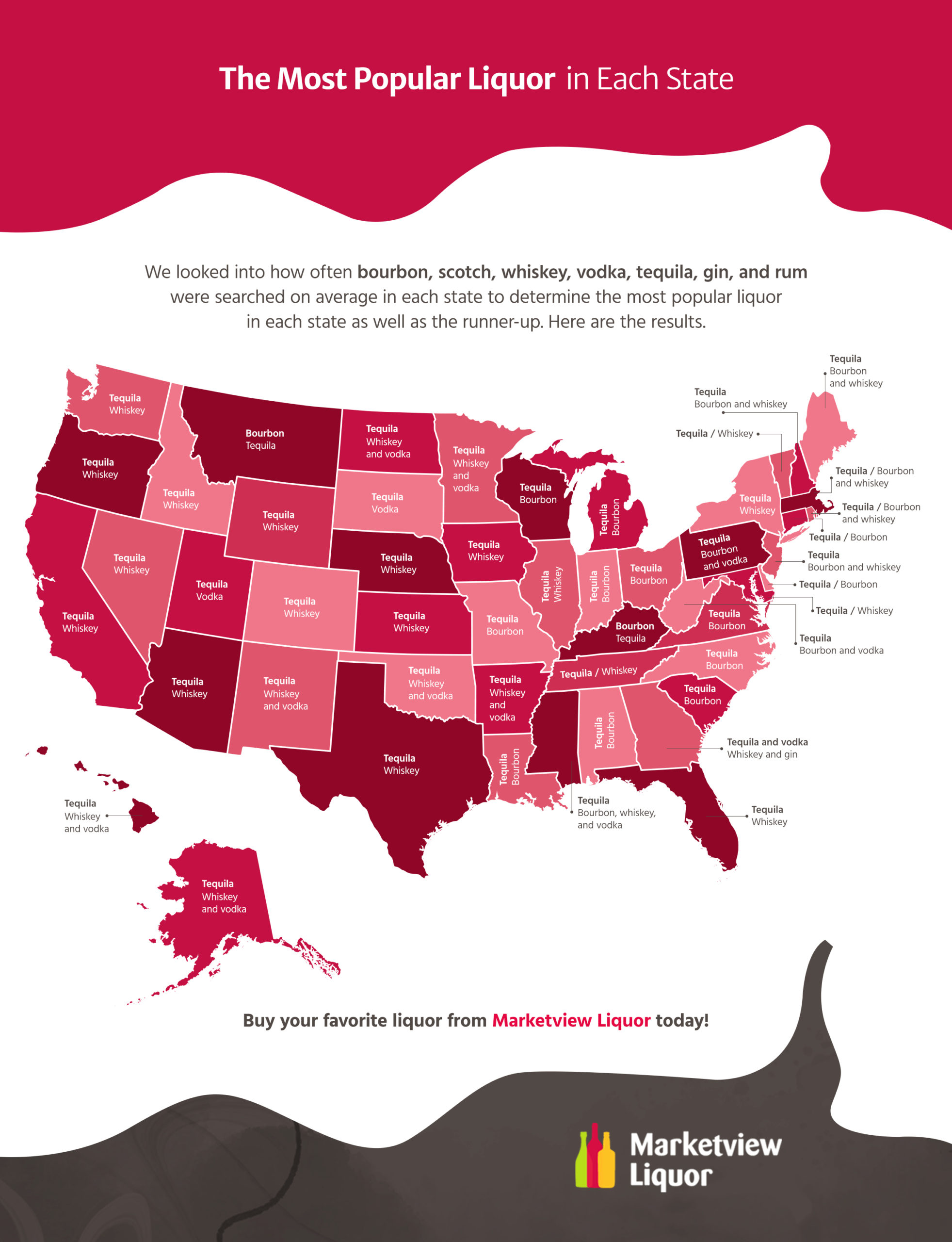
What Is Liquor?
Liquor comes in many forms and flavors. In general, liquor starts as fermented ingredients that go through distillation. Fermentation turns sugars into alcohol. Then distillation removes excess water to create a higher alcohol concentration. Aging in wooden barrels can develop a liquor’s color and flavor over time, though not every spirit goes through this process.
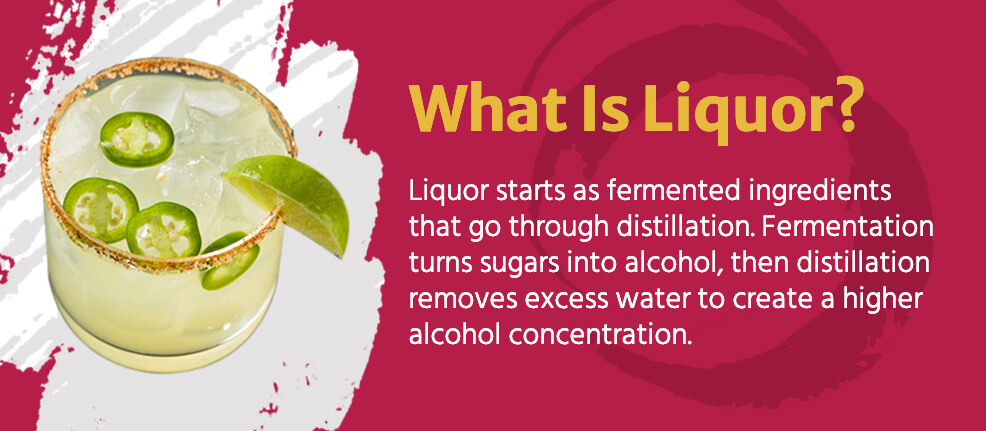
For a drink to be a liquor, it must be alcoholic and distilled. Because of the distillation — and minimal to no added sugar — hard alcohol unsurprisingly has a high alcohol content. Bottles of spirits will tell you on the label the alcohol content in percentages and proof. The percentage refers to the liquor’s alcohol by volume (ABV), and the proof is that percentage doubled. So a spirit with 40% ABV would be 80 proof.
Beer and wine are not hard alcohol because they are not distilled beverages. If you’ve previously only been a beer or wine drinker and you’re nervous about the higher alcohol content in liquor, don’t worry. When using hard alcohol in a mixed drink, the other ingredients help dilute the overall percentage of alcohol. You can adjust the nonalcoholic ingredients to your preference if you prefer a weaker or stronger drink.
While there are flavored types of hard alcohol out there, we will focus on the standard kinds of liquor. Feel free to explore flavor-infused options as you begin trying out different spirits! For now, let’s see what types of liquor are out there.
Types of Liquor
Call these forms of distilled alcohol either liquor, hard liquor, spirits or hard alcohol. Any of these names will suffice for the six general types of liquor.
There are a variety of liquors made from fruit, sugar or grains for you to try. Each of the six types of liquors has a unique flavor profile that pairs well with different nonalcoholic ingredients and other kinds of alcohol. We’ve gathered some classic cocktails you might’ve heard of and tasted before, but perhaps you did not know what spirit was the main ingredient. Read on to learn more about these hard alcohols and their uses.
1. Whiskey
As one of the more complex categories of liquor, whiskey includes a variety of spirits. Scotch, bourbon, and whisky all fall under the umbrella of whiskey. Location of the spirit’s creation is part of what determines the different names. Scotch and whisky come from Scotland, while bourbon is American-made. The ingredients and other rules also play a role in naming.
A variety of hard alcohol like bourbon has many regulations. The restrictions that dictate what can be bourbon include the following.
- A 51% corn-based mash: The mash is the combination of grains that will ferment and distill into a spirit. Bourbon must be mostly corn.
- No additives: A distillery cannot add extra ingredients such as sugar if they want to create bourbon.
- Barreled at 125 proof or less: Once distilled, bourbon must go into the barrel at around 60% ABV to begin the aging process.
- Aged in an oak barrel: Bourbon must age in a new charred oak barrel
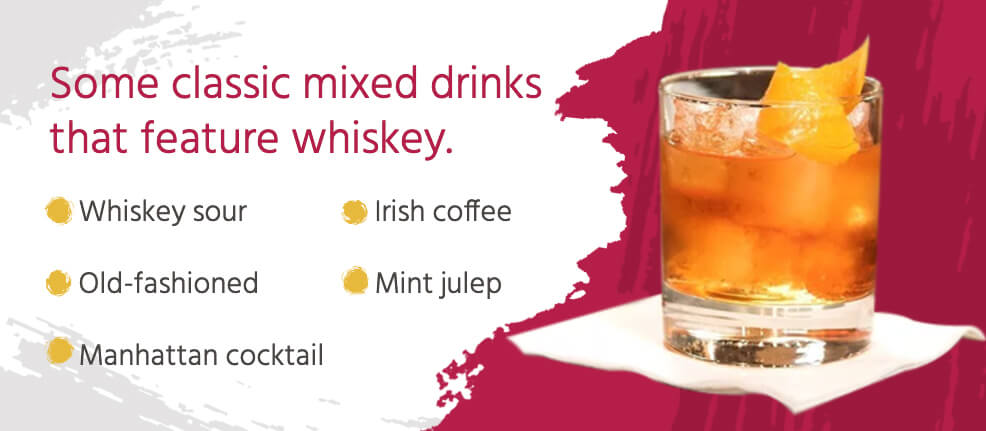
The rules for bourbon help distinguish it from scotch and whiskey, but whichever you choose to drink comes down to preference. When using whiskey in cocktails, select a variety that suits your tastes and the flavor profile of the overall drink. Below is a list of some classic mixed drinks that feature whiskey.
- Whiskey sour: Lemon or lime juice, simple syrup and whiskey make this popular drink. While the drink is a bit sour, as the name implies, you can adjust the levels of syrup, juice and whiskey to suit your preference.
- Old-fashioned: Another classic cocktail, this mix of bitters and sugar can combine with bourbon or rye whiskey. Opt for a sugar cube and soak it in bitters once in the glass for a classic preparation method. Top with your preferred whiskey and an optional splash of club soda or orange peel for garnish.
- Manhattan cocktail: Rye whiskey, bitters and sweet vermouth mix to create this great beginner cocktail. Add dry vermouth and garnish with a maraschino cherry for more flavors.
- Irish coffee: Beginning with an unsurprising base of Irish whiskey and coffee, add sugar, cream and optional whipped cream to make this drink. Use brown sugar instead of white for an even sweeter flavor, and leave out the cream for a bolder coffee taste.
- Mint julep: For a more complicated concoction, muddle mint leaves with sugar. Use crushed ice in this recipe for a traditional drink.
You may choose to use bourbon or rye whiskey — whiskey whose mash is 51% rye grain — as these recipes suggest, but feel free to play around with different whiskeys once you get the hang of those classic cocktails. Despite the wide variety of whiskeys, the alcohol contents remain consistently around 40 to 50%.
2. Brandy
Like whiskey, brandy’s category includes another related spirit — cognac. Unlike other hard liquors, brandy is made with fermented fruit instead of grain. Most of the time, the fruits in brandy include:
- Grapes
- Apples
- Apricots
- Cherries
- Peaches
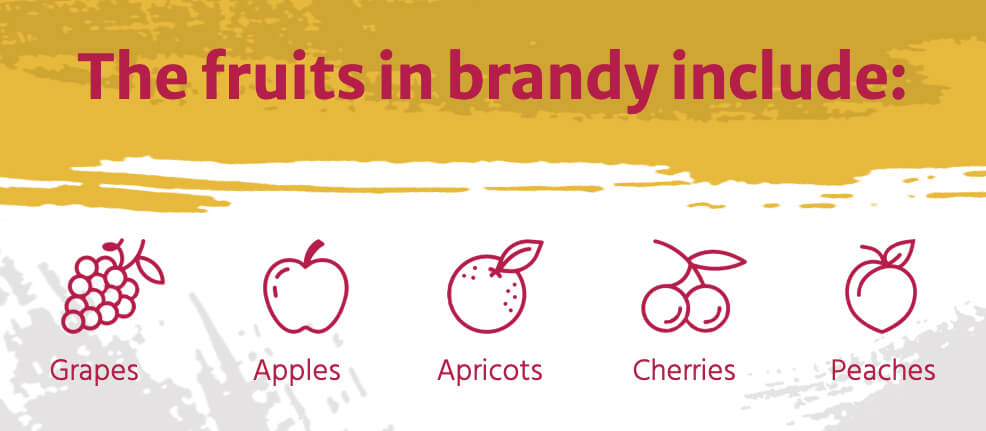
Because of the fruit-based ingredients, brandy has a similar taste to wine. The liquor ages in wood barrels, typically oak, and develops an almost burnt taste in addition to the wine-like profile. Brandy also has a higher alcohol content than wine — usually between 35 and 60%.
Brandy is a sophisticated liquor, often used with a limited number of ingredients in a mixed drink. Some popular concoctions include:
- Brandy cocktail: A straightforward name calls for equally simple ingredients. A brandy cocktail contains brandy, curaçao, and bitters.
- Metropolitan: Combine brandy with sweet vermouth and simple syrup for a Metropolitan cocktail. Because of its simple and mostly alcoholic ingredients, this cocktail can be a bit potent, and we recommend serving it in smaller amounts.
- Brandy Alexander: The dessert cocktail comes from crème de cacao and cream added to a base of brandy. Also called digestifs, dessert cocktails are often sweeter concoctions meant to follow a meal.
- Sidecar: Cognac, orange liqueur and lemon juice combine for this classic cocktail. You could also create this mixed drink with your preferred brandy and play around with balancing the flavors.
- French 75: Sometimes made with gin instead of cognac, this mixed drink includes simple syrup, lemon juice and champagne. Shake the cognac, syrup and juice before pouring over ice and topping with champagne.
The classic liquor comes from all over the world, but only the Cognac region in France can create brandy’s counterpart. No matter which you use, you are sure to create a classic cocktail with a complex and fruity flavor profile.
3. Vodka
Unlike brandy, vodka does not typically age, and the color remains clear. You will find vodkas with alcohol contents ranging from 40 to 50%.
As one of the most popular hard liquor types today, vodka can be a key ingredient in almost any drink. Thanks to vodka’s neutral flavor, its uses range from simple to complex, pairing with one ingredient to multiple other liquors. While vodka comes in various flavors, these mixed drinks use the standard form and add other flavorings.
- Vodka martini: A versatile drink, the vodka martini uses vodka, dry vermouth and bitters along with a garnish like olives or a lemon twist.
- Cosmopolitan: Orange liqueur, lime juice and cranberry juice combine with vodka to make one of the most popular mixed drinks.
- Bloody Mary: Make this cocktail as simple or as complex as you like, starting with a base of tomato juice and vodka. Mix in Worcestershire sauce and hot sauce and garnish with a celery stalk.
- Moscow mule: Choose either ginger ale or ginger beer when making this cocktail. Add lime juice and vodka, and garnish with a lime wedge. While you should serve this beverage in a copper mule mug for it to be traditional, you can use a regular glass, and it will turn out just as good.
- Screwdriver: The most straightforward mixed drink of all combines orange juice and vodka. Adjust the ratios to suit your preference, and try fresh-squeezed orange juice for an even better taste.
Play around with different vodka flavors to suit your tastes and add dimension to these and other cocktails. Since vodka is such a versatile and neutral hard liquor, it is one you’ll want to keep in your cabinet.
4. Rum
Like brandy and unlike other liquors, the process of making rum does not involve fermenting grains. Sugarcane or molasses ferment to create rum. The sweeter spirit comes in many types, including:
- Light
- Dark
- Amber or gold
- Spiced
- Over-proof
- Flavored, such as coconut and other tropical flavors
Different aging processes create different types of rum. Light rum does not age, while dark rum ages in oak barrels. The typical alcohol content sits at 40%, though over-proof varieties can get as high as 75%. Use those different types of rum to create cocktails such as the ones below.
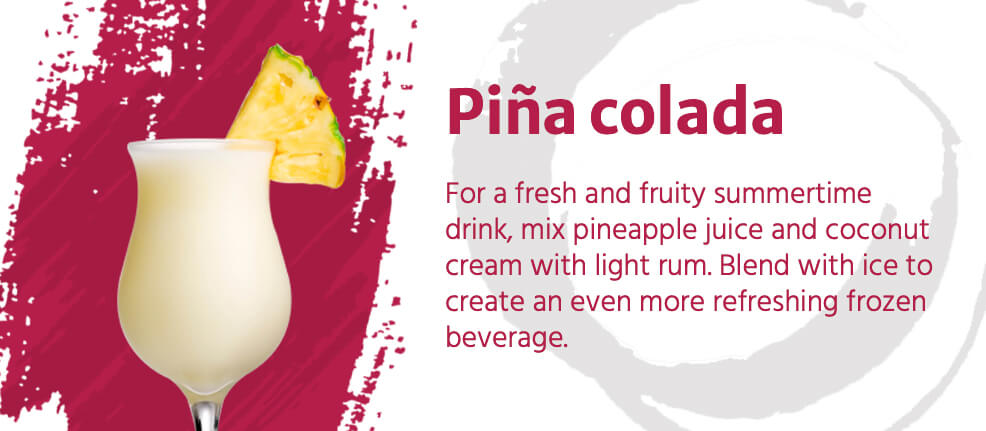
- Daiquiri: You may think of the fruity, frozen blended treat when you picture a daiquiri, but the classic drink uses a mix of rum, lime juice and simple syrup.
- Mojito: Muddle mint with sugar, lime, rum and soda water to make this refreshing drink. Some recipes use powdered sugar, but whichever you choose, be sure to muddle it with the mint and lime juice.
- Piña colada: For a fresh and fruity summertime drink, mix pineapple juice and coconut cream with light rum. Blend with ice to create an even more refreshing frozen beverage.
- Dark and stormy: Dark rum and ginger beer create this simple, yet delicious, cocktail. Add bitters or garnish with an optional lime wedge. More straightforward versions only use dark rum and ginger beer, but no matter what, you will end up with a warmer, but still refreshing, take on the typical fruity rum cocktails.
- Hurricane: A complex beverage like the hurricane shows off the versatility of rum. Passion fruit, orange and lime juices blend with simple syrup, grenadine, light and dark rums to create the tropical drink.
You will find rum distilleries worldwide, but the liquor originates in the Caribbean. The spirit’s roots make it an appropriate choice for tropical and summertime drinks. Once you get into creating rum cocktails, you will want to consider having multiple varieties of rum on hand.
5. Gin
Made from neutral grains such as rye, barley, wheat and corn, gin remains unaged, and is clear, like vodka. The herbal and pine-like aroma of gin comes from the inclusion of botanical ingredients like juniper berries.
Gin has a dry — meaning not sweet — taste that pairs with cocktails that also are not sweet. Here are some favorite gin mixed drinks.
- Gin martini: Shake or stir gin and dry vermouth with an optional dash of bitters. Top with olives or a twist of lemon to complete this classic drink.
- Gin and tonic: Create this easy cocktail to your preference with a simple combination of tonic water, gin and lime.
- Tom Collins: Take gin, lemon juice, simple syrup and club soda in a Collins glass to start this cocktail. Top with a maraschino cherry and a lemon or orange slice.
- Gin fizz: Similar to a Tom Collins, a gin fizz uses gin, lemon juice and simple syrup shaken with an optional egg white and finished off with soda water.
Cocktails made with gin usually do not have many other components since the spirit already has more flavor than the other types of liquors out there. Despite its herbal flavor, most people do not consume gin straight, as you may with other spirits. This clear liquor is a worldwide favorite and usually ranges from 35 to 40% alcohol content.
6. Tequila
Another liquor made from something other than grains, tequila comes from the heart of an agave plant once distilleries bake and juice it. Like other spirits, tequila comes in many varieties depending on its aging process.
- Silver: Also known as blanco, white or platinum, silver tequila ages for a few weeks at most in glass bottles or steel tanks. No wood-barrel aging means no rich brown color.
- Gold: Distilleries add sugars and caramel before distilling to create gold tequila, also called joven or oro. Sometimes, distilleries combine silver tequila with an aged, caramel-color tequila to create the gold spirit.
- Reposado: Since the name means “aged” in Spanish, it’s unsurprising that reposado tequila ages for two to 12 months.
- Añejo: Following the logic of reposado tequila, añejo means “vintage” in Spanish. Its darker color and smoother flavor come from a one-year minimum aging process. The añejo variety becomes “extra añejo” once aged for over three years.
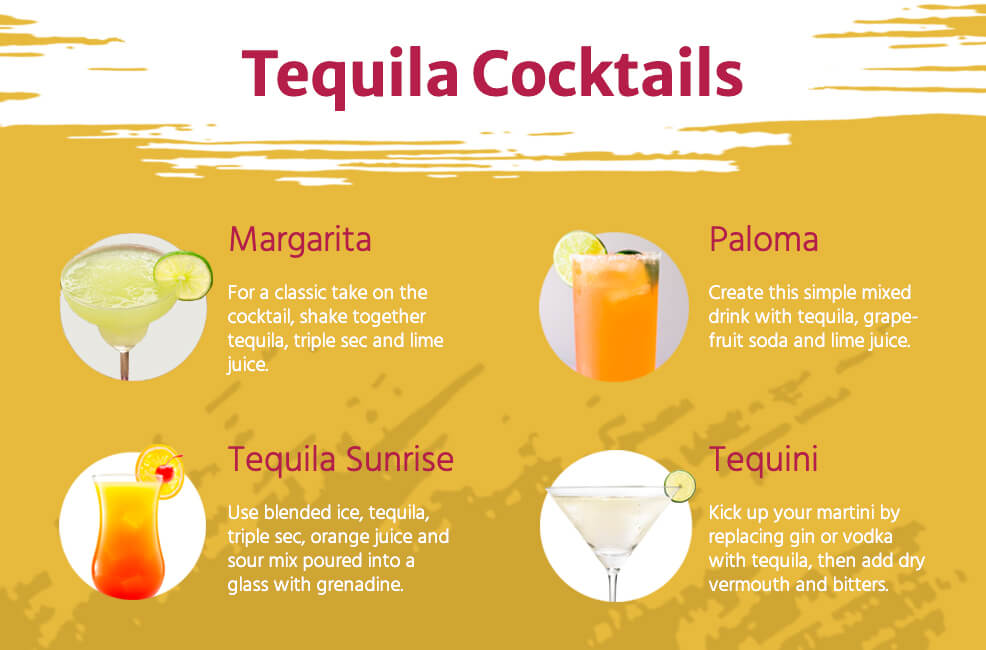
The longer a tequila ages, the more likely it will be to have a higher price. While any variety of tequila can stand on its own in a shot, blanco or reposado variations usually appear in cocktails such as the following.
- Margarita: For a classic take on the cocktail, shake together tequila, triple sec and lime juice. Experiment with different fruit juices and flavors to create a variety of margaritas.
- Tequila sunrise: A colorful concoction like the tequila sunrise uses blended ice, tequila, triple sec, orange juice and sour mix poured into a glass with grenadine.
- Paloma: Create this simple mixed drink with tequila, grapefruit soda and lime juice. Blanco or reposado tequila is best for making a refreshing Paloma.
- Tequini: Kick up your martini by replacing gin or vodka with tequila, then add dry vermouth and bitters. Garnish with the traditional olives or lemon twist, or add chili pepper slices for some heat.
Unlike other spirits made in distilleries worldwide, tequila must come from specific locations in Mexico to have the label “tequila.” The hard liquor is also among the most potent spirits, with an average alcohol percentage of 55. Use caution when creating the above cocktails and others, adjusting the nonalcoholic ingredients if necessary.
The Most Popular Types of Liquor in Each State
Despite the large variety of liquor options available, certain types are purchased more often than others for various reasons. Some people enjoy the sweetness of rum, while others prefer the versatility of vodka. At Marketview Liquor, we wanted to see what the most popular spirits in America were, so we conducted a study based on online search frequency.
Our team discovered that opinions regarding preferred drinks vary from state to state, with different regions enjoying various kinds. We’ve compiled an extensive list of the most loved types of liquor by state to shed some light on these differences.
Now that you know more about the different kinds of liquor, you’ll want to understand the difference between liquor and liqueur. We mentioned recipes above that include a splash of various liqueurs, but what is the ingredient?
Liquor vs. Liqueur
In the most straightforward terms, liqueur is liquor with added sweeteners and flavors. Anything from herbs to fruits can flavor liqueurs, which also have a lower alcohol content than liquor. Expect to find a range between 15 and 30%, though some liqueurs’ ABV can be higher. Because of the added sweetener, liqueurs have a more syrup-like consistency, as well.
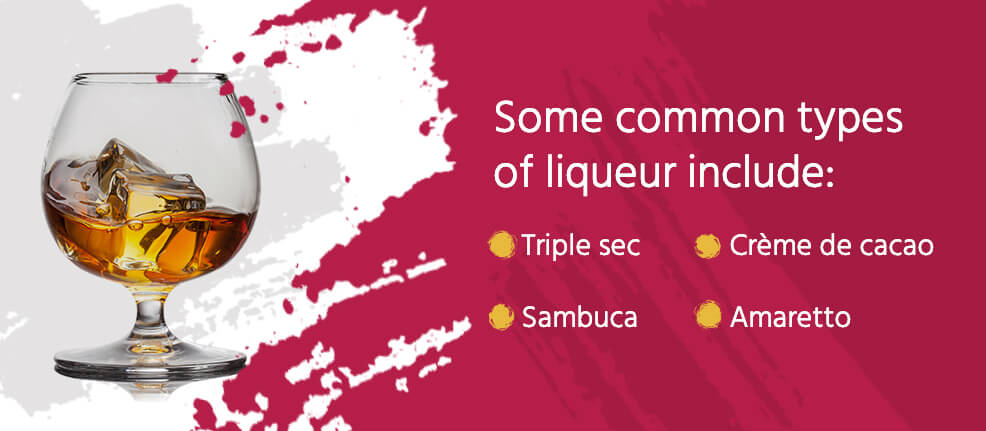
Some common types of liqueurs include:
- Triple sec
- Sambuca
- Crème de cacao
- Amaretto
Liqueurs can enhance the flavor in a mixed drink or take away from the sometimes strong alcohol taste hard liquors add to cocktails. Since liqueurs already contain sweeteners, lower the amount of simple syrup or sugar used in a recipe to maintain a balance. Recipes often account for this adjustment, but if you are playing around with your home bartending, it is something to keep in mind.
You may also see the term “cordial” in cocktail recipes. Cordials are generally the same as liqueurs, being a sweetened spirit. Sometimes, cordials are even sweeter and used in dessert drinks, and sometimes they have no alcohol content. No matter what you call them, liqueurs make a great addition to your at-home bar and homemade cocktails.
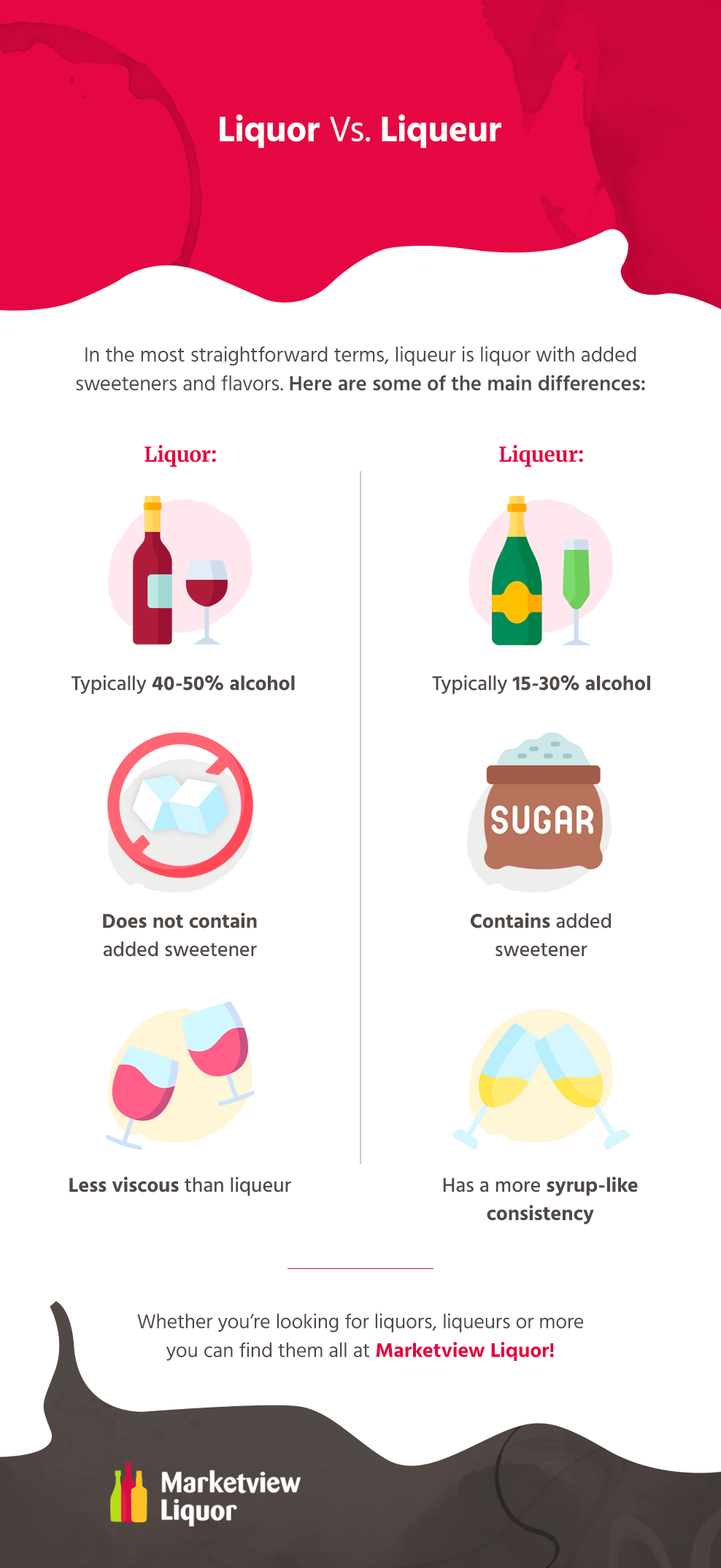
Types of Liquor FAQs
Now that you know a little about each common variety of liquor and how they are made, here are a few other frequently asked questions about this alcoholic beverage.
How Many Types of Liquor Are There?
There are six primary liquors — whiskey, brandy, vodka, rum, gin and tequila. These beverages fall under the liquor category because they use a similar distilling method, but each has a distinct flavor that arises from using different ingredients and aging processes.
Distillers can create additional variations of these liquors by aging the alcohol for more or less time or using different barrel materials to tweak the aging process. They might also add ingredients like spices and herbs to impart new flavors.
What Are the Four Clear Liquors?
Vodka, tequila, rum, and gin all have clear varieties. Of these liquors, most can take on color through processes like barrel aging that change them from clear liquors to brown ones. Clear liquors often have neutral flavors, making them an excellent choice for those who want to create cocktails without adding strong flavor undertones.
What Type of Liquor Is Best?
Every liquor drinker likely holds a different opinion on which variety is best. You can find your favorite by exploring the best liquors from specific locations or choosing a type with a taste you like. For example, rum is a sweeter drink option, while gin has a dryer taste. You can also determine what liquor you like best based on the cocktails you enjoy.
What Is Considered a Hard Liquor?
Any alcoholic beverage produced by distilling fermented grains, vegetables or fruit is considered hard liquor, so all liquors fall into this category. Other alcoholic drinks, like wine and beer, use only fermentation to create alcohol. Fermentation without distillation results in lower alcohol content, meaning undistilled beverages are less “hard” than liquors.
While all liquors are “hard,” some have a higher alcohol content than others. Gin, for example, typically is 35% to 40% ABV, while whiskey often ranges from 40% to 50% ABV. The ABV difference is due to several factors, such as the liquors using distinct ingredients.
What Are the Brown Liquors?
Whiskey and brandy are the most common brown liquors. Scotch, a variety of whiskey, and cognac, a type of brandy, fall into this category as well. Brown liquors get their color from barrel aging, sometimes in charred barrels. This aging process also adds a distinct flavor. Other liquors like rum come in clear and brown varieties. Distilleries might create a light rum or age their rum in barrels like they do for whiskey or brandy to make a sweeter, richer flavor.
What Type of Alcohol Are Spirits?
“Spirit” is another name for liquor, so this alcohol has the same characteristics as liquor.
What Are Examples of Spirits?
Common spirits include six main varieties: rum, gin, whiskey, bourbon, vodka and tequila. Spirits and liquor both refer to the same product, so anything referred to as liquor is also a spirit and vice versa.
Find Liquors, Liqueurs and More at Marketview Liquor
Now you’re ready to shake together everything you learned above and start using various liquors and liqueurs! Fill in the gaps in your liquor cabinet with the varieties of hard alcohol we talked about above. Develop your expertise and impress guests with your knowledge of liquor and mix up some classic cocktails with the types of hard alcohol we’ve outlined here.
When you’re ready to restock or try something new, visit us at Marketview Liquor. Browse our extensive selection of liquors, and when you’ve decided what you need, order online for quick in-store pickup. You can also shop for wine online and get it shipped directly to your home!

